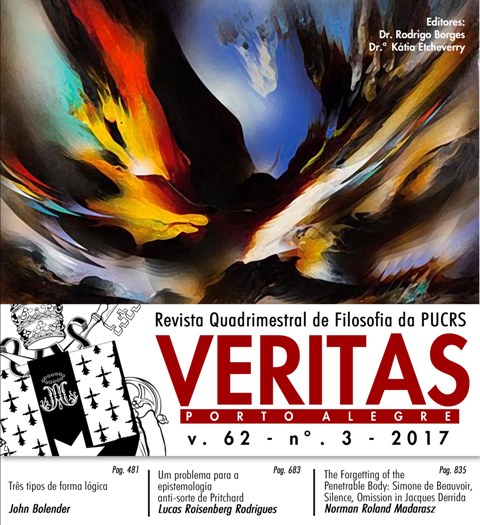About the regimen politicum in De Regimine Principum of Ptolomeu of Lucca
DOI:
https://doi.org/10.15448/1984-6746.2017.3.22664Keywords:
Ptolemy of Lucca, regimen politicum, Aristotelism, political participation.Abstract
Ptolemy of Lucca's Regimine Principum presents a new way of conceiving city's political ordenation, departing from the theoretical framework of Aristotle's Politics in Latin translations. Ptolemy presents new practices and actions for individuals who constitute the city political body. There is, one can assume, a new understanding of the political context from the point of view of the institutional framework, but also from the point of view of the individuals. The notion of regimen politicum begins to be outlined in a few chapters in books II and III, and is the main subject of book IV, where the notion is presented as a conceptual novelty, whether in relation to the Latin tradition before the translation of Politics, either in respect with the political Aristotelianism. The novelty is the Ptolemy's proposal of a political disposition of a city composed in several parts. In such disposition, the role and action of citizens gain centrality in structuring and driving the composed city. This paper intends to show that Ptolemy is very innovative in relation to Aristotelian tradition, most especially concerning the regimen, where political participation of individuals acquires centrality.Downloads
References
Ptolemaeus Lucensis. De regimine principum ad regem Cypri, in Thomas Aquinas, Opuscula omnia necnon opera minora, Tomus primus: Opuscula philosophica, ed. R. P. Joannes Perrier. Paris: Lethielleux, 1949, pp. 221-445.
Ptolomaeus Lucensis. De regimine principum. Ed. Roberto Busa, Turin: Marietti, 1954.
Ptolemy of Lucca. On the Government of Rulers De Regimine Principium. Trad. James Blythe. Philadelphia: University of Pennsylvania Press, 1997. DOI: https://doi.org/10.9783/9780812201338
S. Tommaso D’Aquino. Opusculi Politici. Trad. Lorenzo Perotto. Bologna: Edizioni Studio Domenicano, 1997. [Il governo dei prìncipi al re di Cipro, p.27-395].
Bíblia Sagrada, tradução da CNBB, Brasília: 2010.
Baron, Hans. En Busca del humanismo cívico florentino. Cidade do México: Fondo de Cultura Economica, 1991 [cap. V, pp. 86-122].
Baron, Hans. The Crisis of the Early Italian Renaissance. Princenton: Princenton University Press, 1966. DOI: https://doi.org/10.1515/9781400847679
Bertelloni, Francisco. “Presupuestos de la recepcion de la Política de Aristóteles”, in Aristotélica et Lulliana, Steenbrugis, 1995 [PP. 35-54]. DOI: https://doi.org/10.1484/M.IPM-EB.4.001043
Bertelloni, Francisco. “Quando a política começa a ser ciência (antecedentes históricos e requisitos científicos da teoria política nos séculos XIII e XIV). Analítica, Rio de Janeiro, v. 9, nº 1, 2005, p. 13-38.
Bertelloni, Francisco. “Les schèmes de la philosophia pratica anterieus à 1265: leur vocabolaire concernant la Politique ete les rôle dans la réception de la Politique d’Aristotle”. in L’elaboration du vocabulaire Philosophique au Moyen Age, Brepols, 1998 [171-202].
Blythe, James. “Aristotelism politic and Ptolomeu of Luca” in Vivarium, vol. 40/1, 2002, p. 103-136; Blythe, James. “Civic Humanism and Medieval Political Thought” in Hankins, J. Renaissance Civic Humanism. Cambrigde: Cambrigde University Press, 2004.
Blythe, James. “Civic Humanism and Medieval Political Thought” in Hankins, J. Renaissance Civic Humanism. Cambrigde: Cambrigde University Press, 2004.
Blythe, James. Ideal Government and the Mixed Constitution in the Middle Age. Princenton: Princenton University Press, 1992. DOI: https://doi.org/10.1515/9781400862603
Blythe, James. The Life and Works of Tolomeo Fiadoni (Ptolemy of Lucca). Turnhout: Brepols, 2009. DOI: https://doi.org/10.1484/M.DISPUT-EB.5.105968
Davis, Charles Till. “Ptolemy of Lucca and the Roman Republic”. Proceedings of the American Philosophical Society 118 (1974): 34-50.
Davis, Charles Till. “Roman Patriotism and Republican Propaganda: Ptolemy of Lucca and Pope Nicholas III” Speculum 50 (1975): 411-33. DOI: https://doi.org/10.2307/2854403
Flüeler, Christoph. Rezeption und Interpretation der Aristotlischen Política im späten Mitterlalter. Teil I-II. Amsterdam: B. R. Grüner, 1992. DOI: https://doi.org/10.1075/bsp.19.1
Jordan, Mark. De Regno and the place of political thinking in Thomas Aquinas Medioevo, 1992, vol. XVIII, p. 151-168.
Kantorowicz, Ernest. Os dois corpos do rei: um estudo sobre a teologia política Medieval. Trad. Cid Knipel. São Paulo: Cia das Letras, 1998.
Lepore, Ettore. Il Princeps ciceroniano gli ideali politici della tarda republica. Napoli: Istituto Italiano per gli Studi Storici, 1954.
Avaliação cega
Avaliação cega
Pocock, J. G. A. The Machiavellian Moment: Florentine Political Thought and Atlantic Republic Tradition. Princeton: Princeton University Press, 1975.
Rubinstein, Nicolai. ‘Marsilio da Padova e il pensiero politico italiano del Trecento’ in Medioevo, 1979, vol. V, p. 143-162.
Rubinstein, Nicolai. “Le origini medievali del pensiero repubblicano del secolo XV”, in Studies in Italian History in the Middle Ages and the Renaissance. Roma: Edizioni di Stori e Letteratura, 2004.
Rubinstein, Nicolai. “Marsilius of Padua and italian political thought of his time” in Studies in Italian History in the Middle Ages and the Renaissance. Roma: Edizioni di Storia e Letteratura, 2004.
Rubinstein, Nicolai. “The History of the Word politicus in Early Modern Europe”, in Studies in Italian History in the Middle Ages and the Renaissance. Roma: Edizioni di Stori e Letteratura, 2004.
Senellart, Michel. As artes de governar. São Paulo: Ed. 34, 2006.
Verbeke, Gerard. Moerbeke traducteus et interprète: un texte et un pensèe, in Guilaume di Moerbeke, Brans et Vanhamel, Louvain, 1989.
Downloads
Published
How to Cite
Issue
Section
License
Copyright
The submission of originals to Revista Veritas implies the transfer by the authors of the right for publication. Authors retain copyright and grant the journal right of first publication. If the authors wish to include the same data into another publication, they must cite Revista Veritas as the site of original publication.
Creative Commons License
Except where otherwise specified, material published in this journal is licensed under a Creative Commons Attribution 4.0 International license, which allows unrestricted use, distribution and reproduction in any medium, provided the original publication is correctly cited. Copyright: © 2006-2020 EDIPUCRS</p






